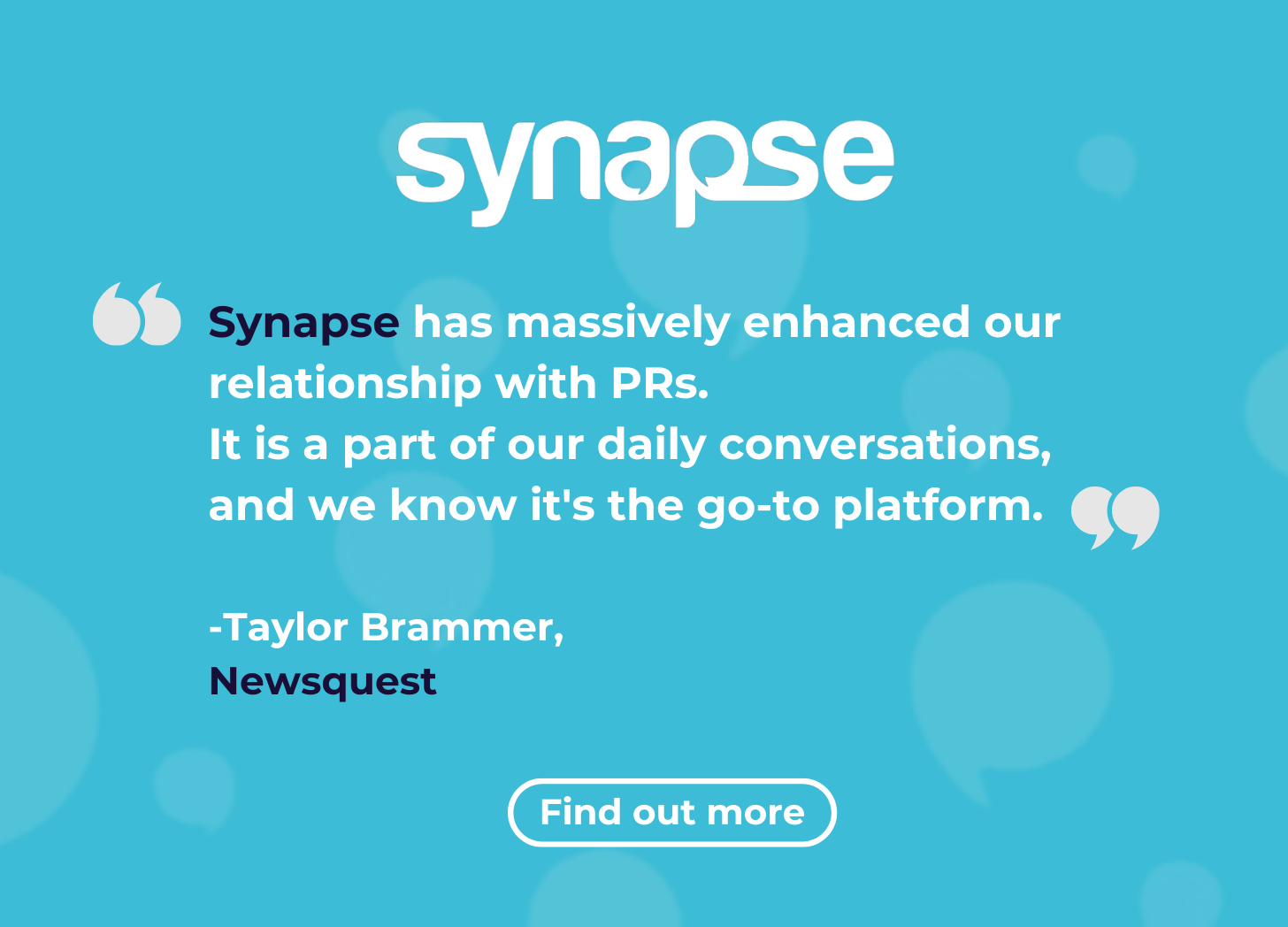Discover how Synapse can help you build meaningful relationships with PRs.
Last week I received a press release that made me chortle, although I don’t think that was the goal. Apologies in advance to any PRs reading this - I know how hard it must be to get our attention. The press release was warning that this Blue Monday would be the BLUEST one so far.
I won’t bore you all with the data that shows Blue Monday does not exist (although buy me a pint and I would happily rant about it for quite some time). The thing that made me laugh the most was that the press release had the wrong date on it so I didn’t know if I was supposed to be most down in the dumps on Monday or Tuesday this week.
All joking aside, January can feel like quite a gloomy time. In the UK at least the weather can be grim, it’s a long old month and there’s several viruses having a field day infecting us all while we spend time cooped up indoors.
For freelancers there is the added joy of the tax return (and subsequent bill) and the bank balance could be looking a bit bleak after the excesses of Christmas and the New Year.
But fear not fellow freelancers. This week we have for you our top tips on managing your mental health alongside the challenges that come with working for yourself. These are all ways in which we can be kind to ourselves and prevent those feelings of overwhelm that can sneak in.
Do bear in mind though that should you have ongoing feelings of depression or anxiety that are impacting your day-to-day life it is important to seek help. Charities such as Mind have resources you can check out should you need to.

1. Set clear boundaries between work and the rest of your life
Many of us work from home which can make it easy for work to bleed into personal time. By the very nature of our work, we’re trying to meet deadlines that can mean sitting at the computer in the evening or at the weekend. And I’m sure I’m not the only one who takes on too much work, positive I can fit it all in, because what if next month I get no commissions?
It is important to have a break from work and to spend time with people you like doing activities you enjoy. If work and personal life merge too much together it can lead to burnout. We suggest:
Having a separate area for work (as far as possible) even if this is a dedicated desk in the corner of a living room or bedroom.
Try to stick to specific working hours. It will make it harder to have downtime if you’re working at the times when everyone you know is having their leisure time. Also if you overwork there will become a point where you are not being efficient with your time.
Make sure others are aware of your boundaries. For example that you won’t be checking emails in the evening or on the weekend.
2. Get your finances in order
Financial stress is a real downside of freelancing. Even when you’re busy in theory, there can be large peaks and troughs in income as invoices take time to get processed. It may be you are working on a big piece of work that has taken time to complete leaving a gap in your income. Every single freelance journalist has experienced the anxiety that comes with being owed a large amount or having a quiet period where your (obviously excellent) ideas are not being picked up.
Some of this is the nature of the job. We’re not salaried and we have to plan for that. To mitigate this stress you should:
Know your budget. Understand the minimum you need to earn and keep track of where you are against that.
Build savings. You need a buffer, an emergency fund that can cover three to six months of your outgoings.
Keep an up to date spreadsheet. If you find this part of the job hard, there are lots of budgeting and invoice/accountancy apps that can help you understand what is coming in and what is going out.
Invoice on time and chase as soon as needed.
Have multiple clients. Over-reliance on any one source of income can leave you in difficulty should that editor leave, commissioning budget get cut or publication close.
3. Look after yourself
When we ask people why they choose to freelance, most of the time they say it is about freedom and flexibility. But let’s be honest, however good their intentions, freelancers can often feel pressured to work constantly to secure their next gig. I’ve done this and it just leads to exhaustion. We have to find the right balance whatever that looks like for us personally.
I try to have at least one decent walk at some point in the day and have screen breaks even if just to boil the kettle. I’ve also been keeping Fridays free for quite some time now. I will inevitably do some work on that day as my week gets out of control but I also book in time to see friends or go for a long run or go to the hairdressers. It’s all part of the joy of freelance. You should consider:
Scheduling breaks in the day away from the desk.
Making sure you get some sort of exercise - whatever you most enjoy.
Taking time off. Just because we don’t get paid holidays doesn’t mean they’re not important. A long weekend away can really help to reset your mind.
Finding a hobby completely unrelated to work that will take your mind off the to-do list.
Putting your phone (and social media) in another room in the evening to make sure you can properly relax.
4. Get a support network
Self employment can be an isolating business. You may do the odd shift or have a gig that requires you to be in an office some of the time but there’s also a lot of time spent at home on your own. That means no one to moan to about work-related gripes, no downtime spent gossiping and no sense check on whether an experience you’re having, perhaps with a difficult editor, is normal or not.
The last time I was in an office, I was driven completely to distraction by someone type SO loudly over the other side of the room, I got nothing done. Turns out I’m so used to working at home on my own I can no longer cope with people. But what I do have is a network of experienced freelance colleagues that I can ask for advice and have a laugh or moan with. It has been vital to my wellbeing. You could try:
Joining an online community like the Freelancing for Journalists Facebook group.
Attending networking events or join co-working spaces to connect with others in real life.
Signing up to mentoring schemes such as that offered by ourselves (closed at the moment but watch this space for updates) and Women in Journalism.
5. Learn how to manage rejection positively
As freelance journalists we will all face rejection. Even the most experienced of us will get ignored or receive a big fat no on an idea we thought was a sure fire winner. Often it is nothing to do with the actual idea but more to do with what else has or is being commissioned, how busy the team are and a myriad of other factors outside our control. It can feel deflating (which is another reason it’s important to be in those support networks). Our tips for not letting it knock your confidence are:
Ask for feedback whenever appropriate - there’s always room to learn.
Keep a record of positive feedback and past wins to remind yourself you can do this.
Understand that rejection is part of the process and it happens to everyone. Think constructively about how you could reframe your pitch or other places that might be interested. Have that plan B from the start.
We always love to hear your wisdom on this. How do you keep a healthy life-work balance. Have you mastered handling rejection? You can contact us at freelancingforjournalists@gmail.com or click the button below.
Are you aware of all the things Freelancing for Journalists has to offer? We’re a newsletter (obvs), podcast, and Facebook community. But we also provide guides, a training course, work to champion freelance rights and have our annual Freelance Journalism Awards. We even started life as a book. You can find out about all of this at our website, so have a visit!
Please fill out our survey!
Freelancing for Journalists has teamed up with Sheffield Hallam University to create The State of Freelance Journalism Report. We believe this is vital in order to fight for the rates, protections and training needed to support those of us working for ourselves. Thank you to the hundreds of you who have already filled this out but to paint an accurate picture we need as many of you as possible. Anyone who works as a full or part-time freelance journalist in the UK is eligible to complete it. All participants (who wish to be) will be entered into a prize draw to win £50 and a set of digital freelancing guides.
Triumph of the week
Chasing down a couple of experts who were proving tricky to contact
That feeling when
You write for a new client and they are happy with your work!
We love to hear your feedback on everything we do, so feel free to drop us an email anytime at freelancingforjournalists@gmail.com
Bye for now!







